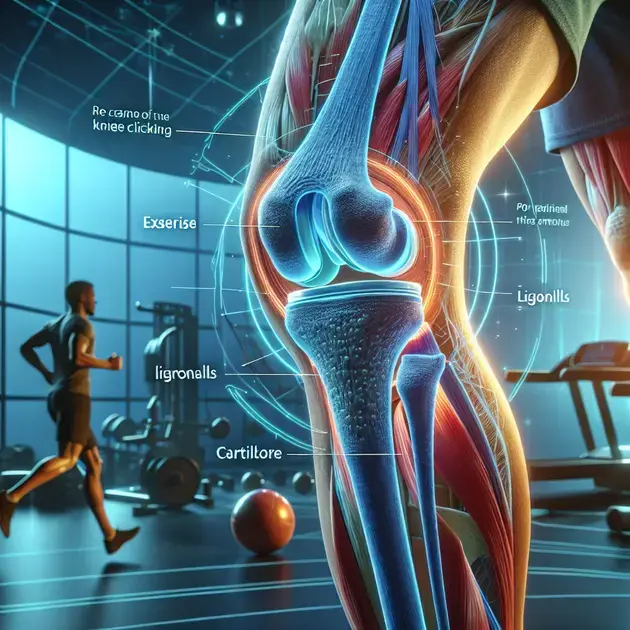Have you ever experienced your knees making a clicking sound when you bend or straighten them? It can be an unsettling sensation for many individuals. In this post, we will delve into the reasons behind why our knees click and what these sounds could indicate.
Understanding the causes of knee clicking is crucial for identifying any underlying issues that may need attention. From everyday activities to potential joint problems, let’s explore the various factors that could be contributing to this audible phenomenon. Stay tuned to uncover the mysteries behind “Why Do My Knees Click? Exploring the Causes Behind the Clicking Sound.”

Common Causes of Clicking Knees
Clicking knees can be a common issue for many individuals, especially those who are physically active or aging. There are several common causes of clicking knees that can range from harmless to more serious conditions. One of the main reasons for knee clicking is air or gas bubbles that build up in the joint, creating a popping or cracking sound when the knee is bent or straightened.
If you are experiencing persistent knee clicking, it is important to consult with a healthcare professional to determine the underlying cause. Some common causes of clicking knees include ligament strain, meniscus tears, or cartilage damage. To diagnose the exact cause of the clicking, your doctor may recommend imaging tests such as an MRI or X-ray.
To help alleviate clicking knees, there are certain exercises and stretches that can be beneficial. Strengthening the muscles around the knee joint through exercises like leg raises and squats can help provide more stability and reduce clicking. Additionally, maintaining a healthy weight and avoiding activities that exacerbate the clicking can also be beneficial.
Another common cause of clicking knees is overuse or repetitive movements. Athletes or individuals who engage in high-impact sports may experience clicking due to the constant strain on the knee joint. To prevent this, it is important to incorporate rest days into your training schedule and vary your workout routine to avoid overloading the knees.
Overall, understanding the common causes of clicking knees can help you take the necessary steps to address the issue and prevent further complications. By seeking professional guidance and incorporating targeted exercises into your routine, you can improve the health and function of your knees.
The Role of Cartilage in Knee Clicking
Cartilage plays a crucial role in the function and movement of the knee joint. When it comes to knee clicking, the condition of the cartilage can have a significant impact on the sound produced during movement. Cartilage acts as a cushion between the bones in the knee, providing smooth and pain-free motion.
However, if the cartilage becomes worn down or damaged, it can result in clicking or popping sounds when the knee is in motion. Conditions such as osteoarthritis or cartilage degeneration can lead to decreased cartilage thickness, causing the bones to rub against each other and produce clicking noises.
To maintain healthy cartilage in the knee joint, it is essential to incorporate foods rich in collagen, such as bone broth or gelatin, into your diet. Collagen helps support cartilage health and can aid in reducing friction between the bones. Additionally, taking supplements like glucosamine and chondroitin sulfate can also promote cartilage regeneration and overall joint health.
If you are experiencing persistent clicking in your knees, it is advisable to consult with a healthcare provider for a proper evaluation. Depending on the severity of the cartilage damage, treatment options may include physical therapy, corticosteroid injections, or in severe cases, surgery to repair or replace the damaged cartilage.
By understanding the role of cartilage in knee clicking and taking proactive steps to maintain its health, you can potentially reduce the clicking sounds and improve the overall function of your knees. Prioritizing joint-friendly activities and incorporating joint-supportive nutrients into your diet can go a long way in preserving cartilage integrity.

**The Relationship Between Exercise and Knee Clicking**
When it comes to the relationship between exercise and knee clicking, there are several factors to consider. One key aspect is the impact of physical activity on joint health. Regular exercise can help strengthen the muscles surrounding the knee joint, providing better support and stability. However, certain types of exercise, especially high-impact activities like running or jumping, can also put stress on the knee joint, potentially leading to clicking sounds.
It’s important to differentiate between harmless knee clicking that results from air bubbles in the joint and clicking that could indicate an underlying issue. In some cases, knee clicking during exercise may be a sign of overuse or improper biomechanics. It’s essential to listen to your body and consult with a healthcare professional if you experience persistent or painful clicking during or after exercise.
Moreover, the relationship between exercise and knee clicking can vary depending on individual factors such as age, fitness level, and pre-existing conditions. Low-impact exercises like cycling or swimming may be more suitable for individuals experiencing knee clicking, as they provide a cardio workout without excessive strain on the joints.
In conclusion, while exercise is generally beneficial for overall joint health, it’s important to be mindful of the impact of certain activities on the knees. By choosing the right types of exercise and incorporating proper form and technique, you can help reduce the risk of knee clicking and maintain optimal joint function.
**Understanding the Role of Ligaments in Knee Sounds**
When exploring the role of ligaments in knee sounds, it’s crucial to understand the structural components of the knee joint. Ligaments are tough bands of tissue that connect bones and provide stability to the joint. In the case of knee sounds such as clicking or popping, ligaments play a significant role in maintaining proper alignment and function.
One common reason for knee clicking related to ligaments is ligament laxity. This condition occurs when the ligaments become loose or overstretched, leading to abnormal movements within the joint. As a result, clicking sounds may occur during certain activities that involve bending or straightening the knee.
In addition to ligament laxity, injuries to the ligaments, such as sprains or tears, can also contribute to unusual knee sounds. These injuries can disrupt the normal function of the ligaments, causing instability and potential clicking sensations during movement.
Furthermore, age can be a factor in ligament-related knee sounds. As we age, the ligaments may lose some of their elasticity and strength, increasing the likelihood of clicking or popping sounds. Maintaining a healthy lifestyle, including regular exercise and proper nutrition, can help support ligament health and reduce the risk of abnormal knee sounds.
**Exploring the Connection Between Age and Joint Clicking**
Age can play a significant role in the occurrence of joint clicking, including in the knees. As we get older, the structures within our joints, such as cartilage and ligaments, may undergo changes that affect their function. This can lead to increased friction within the joint, resulting in clicking or popping sounds during movement.
One specific aspect of joint clicking related to age is the degeneration of cartilage. Cartilage serves as a cushion between the bones in a joint, helping to reduce friction and absorb shock. Over time, cartilage may wear down or develop irregularities, causing the bones to rub against each other and produce clicking sensations.
In addition to cartilage degeneration, age-related changes in joint fluid viscosity can also contribute to joint clicking. Synovial fluid, which lubricates and nourishes the joints, may become less viscous with age, affecting the joint’s ability to move smoothly and quietly.
It’s important to note that not all joint clicking in older individuals is a cause for concern. However, persistent or worsening clicking, especially if accompanied by pain or swelling, should be evaluated by a healthcare provider. Implementing strategies to support joint health, such as maintaining a healthy weight, staying active, and addressing any underlying medical conditions, can help reduce the impact of age on joint clicking.
Conclusion
Understanding the relationship between exercise and knee clicking is essential for maintaining optimal joint health. While regular physical activity can strengthen the muscles around the knee joint, certain high-impact exercises may also lead to stress and clicking sounds. It is crucial to differentiate between harmless clicking and signs of underlying issues, seeking professional advice if needed.
Exploring the role of ligaments in knee sounds reveals how these tough tissue bands contribute to joint stability. Factors like ligament laxity or injuries can result in abnormal knee clicking during movement, emphasizing the importance of proper care and attention. Age-related changes can further impact ligament health, making it vital to prioritize lifestyle habits that support ligament function.
Age also plays a significant role in joint clicking, particularly due to cartilage degeneration and changes in joint fluid viscosity. These factors can lead to increased friction within the joint and the production of clicking sounds. While not all joint clicking may be concerning, persistent symptoms should prompt a consultation with a healthcare provider to address any potential issues and maintain joint health.